|
|
|
The
Mayors
of
Memphis
... From 1827
to the Present |
|
|
|
|
 |
In
1819, James Winchester, Andrew Jackson, and John Overton founded a
city on the fourth Chickasaw bluff. At that time this
settlement was four blocks wide with a population of fifty and
Winchester named the settlement "Memphis". A charter was
drawn up, creating the office of Mayor and a board of aldermen.
The aldermen would be elected by all the people in town, and the
mayor would be elected by the board of aldermen. The first
Mayor was Marcus Winchester, son of James. |
|
|
|
Once
the mayor had been chosen the issue was how to pay for
the newly installed government. So taxes were assessed on
property owners. The peddlers, tavern keepers, doctors
and lawyers paid a business levy. In addition each free
male and slave were levied a 25 cent tax for residing in
Memphis. Since that time, Memphis has maintained various
mayor-council forms of government. Today there are 13
seats on the council with seven positions being elected from
single-member districts, and two districts electing three
representatives each. The mayor is elected by the entire
voting population. All of the Memphis Mayors from 1827
to the Present are covered below . |
|
|
|
|
|
|
|
|
|
|
|
Click on small photos to
see larger images |
|
|
|
|
|
|
|
|
|
|
|
|
|
| |
|
|
|
Marcus B. Winchester
1827 - 1829 |
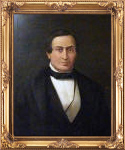 |
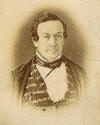 |
| |
|
Marcus Winchester, son of founder James
Winchester, had made the Chickasaw bluffs
settlement his home. He had served as a real
estate agent and opened the first store in the town.
He was also one of the first five members of the
Quarterly Court and was elected Register in 1820.
When the city was incorporated in 1826, he was elected
the first Mayor. He also operated a ferry and
served as postmaster until 1849. Around
1823, Winchester married Mary, whom most historians
agree was a "woman of color" and his career did
decline. His grave is "somewhere" in
the area of Winchester Park, which originally was the
Winchester Cemetery. |
|
| |
|
|
|
|
| |
|
|
|
Isaac Rawlings
1829- 1831 |
 |
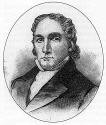 |
| |
|
|
|
Isaac Rawlings was a pioneer settler and the 2nd
Mayor. After the incorporation of Memphis
he remained a populist leader, being elected
Mayor twice. He became a great student of
law and was honored with the title of "Squire
Rawlings." He always considered
Memphis a "rowdy, river town" and insisted that he not
be buried in Memphis. His grave is in the nearby
old Raleigh Cemetery. |
|
| |
|
|
|
|
|
|
| |
|
|
|
Seth Wheatley
1831- 1832 |
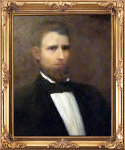 |
|
| |
|
|
|
Seth
Wheatley was a lawyer with ability who stood up for the
"poor man". During his administration Memphis became
the object of fierce contention between the states of
Mississippi, Arkansas, and the Chickasaw Indians.
All three claimed the city was built on part of their
land. A re-survey settled the dispute. After
his stint as mayor, Wheatley became President of the
Farmers and Merchants Bank of Memphis. |
| |
|
|
|
|
|
|
| |
|
|
|
Robert Lawrence
1832- 1833 |
 |
|
| |
|
|
|
From the
beginning of his term, the voters of Memphis made it clear
they wanted a stronger
leadership than Lawrence provided.
Shortly after his election, a census was taken that
revealed that the population of Memphis had increased to
906. So the town limits were expanded to bring in
more tax. |
| |
|
|
|
|
|
|
| |
|
|
|
Isaac Rawlings
1833- 1836 |
 |
 |
| |
|
|
|
Isaac Rawlings was a pioneer settler and the 2nd
Mayor. After the in corporation of Memphis
he remained a populist leader, being elected
Mayor twice. He became a great student of
law and was honored with the title of "Squire
Rawlings." He always considered
Memphis a "rowdy, river town" and insisted that he not
be buried in Memphis. His grave is in the nearby
old Raleigh Cemetery. |
|
| |
|
|
|
|
|
|
| |
|
|
|
Enoch Banks
1836- 1837 |
 |
|
| |
|
|
|
During the
administration of Enoch Banks, Memphis purchased a fire
engine as an expanded town service. And a
board of health was appointed to report all causes of
disease, and the printing of death notices was begun. |
| |
|
|
|
|
|
|
| |
|
|
|
John H. Morgan
1837 - 1838 |
 |
|
| |
|
|
|
John H.
Morgan also attempted to improve conditions in Memphis.
The board of aldermen passed an ordinance requiring the
operators of dray wagons to obtain a license for ten
dollars per year, and if a driver was found "...guilty of
staling of of having received stolen goods, he shall
forfeit license and be thereafter prohibited from driving
a cart, dray, or wagon within corporate limits." A
few months later the aldermen passed a more stringent law
that imposed "a penalty on persons shooting, whooping,
gambling or swearing within the limits of the town."
Fines ranged from five dollars for swearing to ten dollars
for discharging a firearm and fifty dollars for gambling. |
| |
|
|
|
|
|
|
| |
|
|
|
Enoch Banks
1838 - 1839 |
 |
|
| |
|
|
|
2nd
Term, Enoch Banks : See above ... |
| |
|
|
|
|
|
|
| |
|
|
|
Thomas Dixon
1839 - 1841 |
 |
|
| |
|
|
|
Mayor
Thomas Dixon expanded the anti-crime measures implemented
by Mayor Morgan. He realized the constable
couldn't patrol the town 24 hours a day, so the board of
aldermen hired two night watchmen to patrol the town's
streets from 10- PM to daylight. Dixon and the
aldermen also passed an ordinance requiring dog owners to
buy a license and place an identification collar around
the dog's neck. If a dog was found without a collar,
it would be shot by the town;s constable. During this
administration a larger fire engine was purchased.
In spite of Dixon's accomplishments in fighting crime and
expanding city services he was defeated for reelection by
William Sickernagle in the next election. |
| |
|
|
|
|
|
|
| |
|
|
|
William Spickernagle
1841 - 1842 |
 |
|
| |
|
|
|
Prior to
this time, the office of Mayor had few powers and didn't
even pay a salary. This now changed under
Sickernagle's tenure, when a salary of $500 per year was
provided. And he addressed another major concern:
Flatboat operators had refused to pay city fees when they
docked at the city-operated wharf. This severely
restricted the ability of government to provide services.
Sickernagle hired Dick Davis as Wharf Master, offering him
25% of his collections and promised to stand by him.
Soon wharfage fees filled the city's treasury. |
| |
|
|
|
|
|
|
| |
|
|
|
Edwin Hickman
1842 - 1845 |
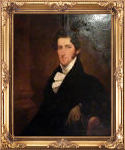 |
|
| |
|
|
|
Edwin
Hickman defeated Sickernagle in the next election.
The rage of the flatboat operators over paying a tax
turned bitter in 1842. 500 Flatboats were docked at
the wharf. One owner brandished a spiked club and
threatened to "comb the wharf master's head" with his
club. He continued the same threats when the
wharf master showed up. The gathering crowd of seamen now
boosted his moral. The militia came out ... and this
event ended after the boat owner went to sea and
continued to taunt the militia. They fired upon his
boat, killing him. This decisive action by Hickman
and the Wharf Master broke the power of the flatboat
men and secured this important revenue for the city's
treasury. |
| |
|
|
|
|
|
|
| |
|
|
|
Jesse J. Finley
1845 - 1846 |
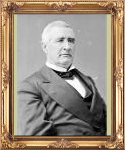 |
|
| |
|
|
|
Jesse J.
Finley was born near Lebanon, Tennessee and pursued an
academic course. He studied law and was admitted to
the bar in 1838. In 1842, he moved to Memphis and
continued the practice of law. He served as mayor of
Memphis in 1845. In 1846 he moved to Florida where
he remained the rest of his life. |
| |
|
|
|
|
|
|
|
|
|
|
|
Edwin Hickman
1846 - 1847 |
 |
|
| |
|
|
|
3rd Term.
See Above ... |
| |
|
|
|
|
|
|
| |
|
|
|
Enoch Banks
1847 - 1848 |
 |
|
| |
|
|
|
3rd Term:
Memphis and South Memphis merged adding significantly to
the revenue in the Treasury. |
| |
|
|
|
|
|
|
| |
|
|
|
Gardner E. Locke
1848 - 1849 |
 |
|
| |
|
|
|
Gardner E.
Locke tied for votes with his opponent forcing the Board
of Aldermen to choose. After two ballots they chose
Gardner. In a short time he convinced the alderman
to pass a big ordinance establishing free public schools
in Memphis. Two new schools opened shortly.
Opposition arose over the funding of public schools and
called for discontinuance of free education, but it was
quickly rejected. Locke introduced a new
ordinance guaranteeing that "all white children between
the ages of six and 16 had the opportunity to attend a
free public school." Opposition to this bill caused a
big divide in the next election and Locke was defeated. |
| |
|
|
|
|
|
|
| |
|
|
|
Edwin Hickman
1849 - 1852 |
 |
|
| |
|
|
|
3rd Term:
When Hickman resumed his Mayoral duties he remained a
dedicated foe of crime as one would expect of the executive who
had crushed the flatboat insurrection. During his
3rd
Term, ordinances were passed making gambling, illegal, as
well as organized
prostitution, animal cruelty. All
businesses were now required to close on Sundays. |
| |
|
|
|
|
|
|
| |
|
|
|
A. B. Taylor
1852 - 1855 |
 |
|
| |
|
|
|
South
Memphis had been added to the growing boundaries of
Memphis and these
additional voters shifted the political balance to elect
A. B. Taylor as mayor. He served until 1855.
Taylor established a city high school, constructed a new
jail, and improved local transportation by having wooden
planks laid on the surface of Adams and Madison.
An ordinance was also passed authorizing the city hospital
to treat destitute Memphians who couldn't afford medical
treatment. He was also one of the founders of
Elmwood Cemetery. |
| |
|
|
|
|
|
|
| |
|
|
|
Addison H. Douglass
1855 - 1856 |
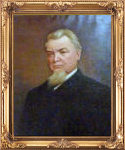 |
|
| |
|
|
|
Public
Health was a big concern for Addison H. Douglass.
During the summer of 1855, Yellow Fever spread through the
Lower Mississippi Valley, infecting more than 1200
Memphians and killing 220 of them. During Douglass'
one term the city also issued a number of bond issues for
railroads and street construction. By the end of the
1850s, municipal debt ballooned to more than $1 million.
And there was much waste as well as misuse of public
funds. This will effect Memphis for decades to come. |
| |
|
|
|
|
|
|
| |
|
|
|
Thomas B. Carroll
1856 - 1857 |
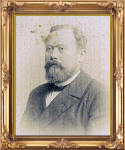 |
 |
| |
|
|
|
Thomas B.
Carroll had inherited from his father, a former Governor of
Tennessee, warm, impulsive, and fearless qualities.
He was also outspoken, with a quick and impulsive
temperament in all his dealings with men - which sometimes
made enemies. Yet he was quick to repair a wrong
when convinced that he had erred. He was elected to
clean up the waste and misuse, but died unexpectedly at the age of 38 in 1857
before his term was over.
Ironically the board of aldermen drafted Addison H.
Douglass to complete Carroll's term. The
Memphis and Charleston railroad had been completed and a
grand Railroad Jubilee was organized to celebrate the
"wedding of the Atlantic Ocean and Mississippi River."
There weren't enough hotels to take care of all the
visitors who had traveled to Memphis to be part of the
festivities. The Navy Yard held a banquet for 10,000
people. Much had changed since this little hamlet was
established in 1826. The population was now 22,000
residents. |
| |
|
|
|
|
|
|
| |
|
|
|
Richard D. Baugh
1857 - 1861 |
 |
|
| |
|
|
|
Richard D.
Baugh |
| |
|
|
|
|
|
|
| |
|
|
|
John Park
1861 - 1864 |
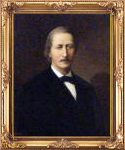 |
|
| |
|
|
|
John Park
was mayor when the Union took over Memphis and occupied
the city during the Civil War. He has the
distinction of having to surrender the city to the Union. The government of the
city was then dictated by Ulysses S. Grand and General Sherman.
After they put General Washburn in charge, he ordered the Memphis Government to be suspended
and forbid these officials to perform any official acts or
to exercise any authority. |
| |
|
|
|
|
|
|
| |
|
|
|
Thomas H. Harris
1864 |
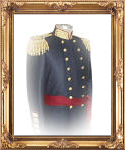 |
|
| |
|
|
|
Lt. Col.
Thomas H. Harris of the Union Army was appointed "Acting Mayor"
by General Washburn, during the
Union occupation of Memphis. |
| |
|
|
|
|
|
|
| |
|
|
|
Channing Richards
1864 - 1865 |
 |
|
| |
|
|
|
Channing
Richards of the Union Army was appointed "Acting Mayor" when
Lt. Col. Thomas H.
Harris resigned. |
| |
|
|
|
|
|
|
| |
|
|
|
John Park
1865 - 1866 |
 |
|
| |
|
|
|
2nd Term:
The Civil War ended and the government was turned over to
Memphis. All the officials from 1864 were
reinstated. |
| |
|
|
|
|
|
|
| |
|
|
|
William Lofland
1866 - 1868 |
 |
|
| |
|
|
|
The first
election after the Civil War was in 1866. William
Lofland was elected as the first post-war Mayor. The
Metropolitan Police District was organized under a Police
Commissioner. Legislation was passed that extended
the terms of Mayor and Aldermen to two years. All
voters were required to register to vote. ... and
then, the riots
of 1866! |
| |
|
|
|
|
|
|
| |
|
|
|
Edgar
M. McDavitt
1868 |
 |
|
| |
|
|
|
Edgar M.
McDavitt was a successful financier and leading wholesale
merchant. He was elected 4 terms as alderman in the
1850s. His firm failed during the Civil War and he became the first President of the Bank of Commerce.
He was one of several "Interim Mayors" of Memphis. |
| |
|
|
|
|
|
|
| |
|
|
|
John
W. Leftwich
1868 - 1869 |
 |
 |
| |
|
|
|
John W.
Leftwich was involved in mercantile pursuits before the
Civil War. When Tennessee was allowed to have
representation after the war, he was elected to Congress,
and later became Memphis Mayor in 1869 and 1870. |
| |
|
|
|
|
|
|
| |
|
|
|
John
T. Swayne
1869 |
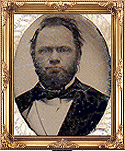 |
 |
| |
|
|
|
John T.
Swayne was mayor post-Civil War. He died of Yellow
Fever during the 1873 epidemic. |
| |
|
|
|
|
|
|
| |
|
|
|
John
W. Leftwich
1869 - 1870 |
 |
 |
| |
|
|
|
2nd Term:
Legislation was passed granting the city a new Charter,
which REDUCED the City Limits. |
| |
|
|
|
|
|
|
| |
|
|
|
John
Johnson
1870 - 1874 |
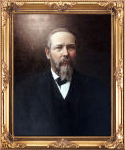 |
 |
| |
|
|
|
Memphis now
had a population of 40,226. Mayor Johnson reported
that the treasury didn't have a dollar of cash and credit
was so impaired that the city was paying double the price
for services and supplies - all which he considered
"appalling." He proposed that the city be run on a
"cash basis", but this didn't win any support. Crime
was rampant. The streets were in poor condition and
sewage was never picked up. There was a foul smell
everywhere. Memphis would pay the penalty for this
neglect. The winter of 1873 brought small pox, and
then the summer brought the Yellow Fever which reached
epidemic proportions with over 1244 deaths. |
| |
|
|
|
|
|
|
| |
|
|
|
John
Loague
1874 - 1876 |
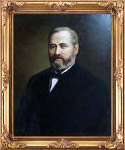 |
|
| |
|
|
|
John Loague
was a good financier and his first act was to reduce the
city's debt and the overwhelming burden of taxes. He
proposed a commission who would work to get financers to
agree to payment less than face value. NO DEAL.
He was forced to issue "Script" as partial payment.
But the city had begun to pay attention to sanitation.
However when one summer passed without a return of Yellow
Fever, carelessness set in once more. |
| |
|
|
|
|
|
|
| |
|
|
|
John
R. Flippin
1876 - 1879 |
 |
|
| |
|
|
|
John R.
Flippin continued legislation to improve the city's debt
with a little success. The city was in trouble and
there were proposals to dissolve the City Government.
Yellow Fever had stayed away for five years and during
this time the city had slipped back into its old filth.
Now the fever returned in the midst of all the financial
ruin. And this time it was horrendous with over 5000
deaths - and then it returned the following year and
claimed 600 more. When it was over, Memphis was a
ghost city. The city was further humiliated when
their charter was revoked. It was no longer a city -
only a taxing district. |
| |
|
|
|
|
|
|
|
|
|
TAXING DISTRICT ... 1879 - 1893 |
|
|
|
As a result of the yellow fever epidemic in 1878 and 79, Memphis
lost so much of its population that it was disincorporated and its
charter was not reinstated until 1893. Thus there was no Mayor
from 1879 - 1893.
The city leaders during
this period were known as "President of the Taxing District" |
|
|
|
|
|
When the city's charter was reinstated in 1893, Walker L.
Clapp, as the current "President of the Taxing District"
automatically became the Mayor. |
|
|
|
|
|
|
| |
|
|
|
Walker L. Clapp
1895 - 1898 |
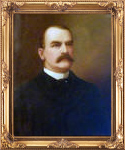 |
 |
| |
|
|
|
Walker Lucas
Clapp practiced law with his father and was admitted to
the bar in 1874. In 1887 he was selected speaker of
the Tennessee House of Representatives. He lost the
1898 mayor's election by just over 500 votes to Joseph J.
Williams. |
| |
|
|
|
|
|
|
| |
|
|
|
Joseph
John Williams
1898 - 1906 |
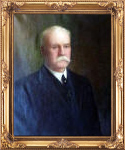 |

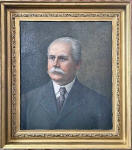 |
| |
|
|
|
J. J.
Williams was educated in the private schools of Memphis
where he began studying medicine under his father.
After his father's death J. J. entered politics as a
bookkeeper. In 1896 he was elected County Trustee, a
position he resigned after being elected Mayor.
Williams was noted for his capacity for business, suavity
of manners, fine appearance, and genial nature. |
| |
|
|
|
|
|
|
| |
|
|
|
James
H. Malone
1906 - 1910 |
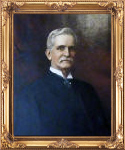 |
 |
| |
|
|
|
James H.
Malone's record was considered "absolutely clean" and "
one that he should be proud of and the community grateful
for." He is the Mayor who "Paved Memphis", expanded
the artesian water system, and doubled the funding of
Public Schools. He also wrote "Chickasaw Nation",
a history for the centennial of
Memphis, while he was Mayor of Memphis. |
| |
|
|
|
|
|
|
| |
|
|
|
Edward
Hull Crump
1910 - 1915 |
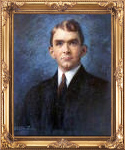 |
 |
| |
|
|
|
E. H. Crump
had a rising business career where he began to make
political connections that served him for the rest of his
life. By 1919 he had built a political machine which
came to have statewide influence. And unlike most
Southern Democrats, he was not opposed to blacks voting. For the most
part, they were reliable Crump voters as long as the party
paid their poll taxes. He manipulated the blacks
with the "help me, I'll help you" form of politics
and skillfully manipulated Republicans who at this
time were weak in Tennessee. He was
influential for nearly 50 years by
generally working behind the scenes. He served only
three two-year terms as mayor at the beginning of his
career. Yet he named the next several Memphis
mayors.
To
be continued below ... The Crump Machine in action ...
|
| |
|
|
|
|
|
|
| |
|
|
|
George
C. Love
1915 - 1916 |
 |
 |
| |
|
|
|
George C.
Love had been in the Wood and Lumber business and later
went into the Steamboat business. Always interested
in politics, his friends in 1901 urged him to run for the
board of Public Works. He was elected and became head of the Department of Streets,
Buildings, and Sewers. Later he won the
election for Mayor - and was considered a good Mayor. |
| |
|
|
|
|
|
|
| |
|
|
|
Thomas
C. Ashcroft
1916 - 1917 |
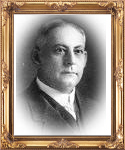 |
 |
| |
|
|
|
The Memphis
theatre managers had begun "testing" the Sunday "Blue
Laws" by opening on Sundays. This created a huge
political turmoil in the city. Ashcroft had
allowed the theatres to remain open on Sunday and
consequently he and
other officials were ousted from office during the
fallout. |
| |
|
|
|
|
|
|
| |
|
|
|
Harry
H. Litty
1917 - 1918 |
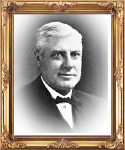 |
 |
| |
|
|
|
Harry Litty
immediately set about enforcing the "Blue Laws" to the
letter, as he said "... not because they're right, but
because they are on the books." Litty was a
prominent lawyer of Memphis as well as a railroad engineer
on the Frisco Line. Had the honor of being the first
engineer to drive a passenger train across the Mississippi
River. During his tenure as Mayor he also set his
goal on reducing public expenditures. Litty Park is
named in his honor. |
| |
|
|
|
|
|
|
| |
|
|
|
Frank
L. Monteverde
1918 - 1919 |
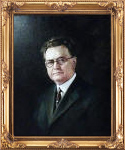 |
 |
| |
|
|
|
Monteverde
was the first native Memphian to hold the position of
Mayor and the first and only Italian American Mayor.
He also defeated the Crump Machine of the time.
While Mayor he aggressively worked to eradicate malaria
from the mid-south area. Before becoming Mayor, he
had been Sheriff and was responsible for hiring the
first blacks for the Memphis Police Department and
appointing the first black detectives. He was
for total law enforcement. |
| |
|
|
|
|
|
|
| |
|
|
|
Rowlett Paine
1920 - 1927 |
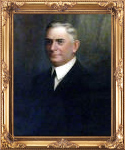 |
 |
| |
|
|
|
Mayor Paine
and E. H. Crump joined forces to fight the local Ku Klux
Klan, who opposed his candidacy, and nearly lost.
Later Paine and Crump turned on each other. The city
went on a building spree ... the bootleg booze binge
... cotton prices plummeted ... the great flood of 1927,
crowding Memphis with refugees. As a reform mayor,
Paine's contributions to the city have been largely under
exposed and under appreciated. He ultimately lost
out to the Crump machine in 1927. |
| |
|
|
|
|
|
|
| |
|
|
|
Watkins Overton
1928 - 1939 |
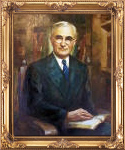 |
 |
| |
|
|
|
When
Watkins Overton ran for Mayor, construction of an airport
was a major focus of his campaign. After his
election, which was totally backed by Crump, he appointed an airport planning commission and
the Memphis Municipal Airport opened for business in 1929.
The city was also $900,000 in debt when he took over.
He managed, during the depression, to erase the debt and
accumulate a $1 million surplus.
He also
successfully lobbied for federally funded projects through
the WPA and PWA. |
| |
|
|
|
|
|
|
| |
|
|
|
Edward
Hull Crump
1940 |
 |
 |
| |
|
|
|
This 1940
scenario shows the Crump Machine "in action": Crump
had been named to the Democratic National Committee in
1936 and served until 1945. In 1939 he was elected a
final time as Memphis Mayor, although that term was
officially served by Walter Chandler. Crump felt
that Walter Chandler, the U.S. Representative for the
Ninth District, could spend his time better tending
to congressional matters in Washington than campaigning
for mayor in Memphis. So without a platform, without
a speech, and without opposition, Crump was elected mayor
of Memphis. He was sworn in at a few minutes past
midnight. With laughter, he resigned immediately.
Vice Mayor Joseph Boyle became Mayor until the next day,
when the Memphis City Commission elected Chandler.
Watkins Overton's term had ended at midnight, and so
Memphis had four mayors in less than 24 hours.
Crump's statewide influence began to wane in the late
1940s. For the rest of his life, his influence was
largely limited to Memphis. What did Memphis get out
of this "deal":
Crump's marks on
Memphis can be still be seen today. He was a strong
supporter of fire service and for many years the Memphis
Fire Department was considered one of the best in the
country and is still quite well regarded. He felt
separate operations for each municipal utility were
inefficient and today, the Memphis Light, Gas, and Water
is one of the largest combined municipal utilities in the
United States. He believed that cities shouldn't be too
noisy. Memphis has strong noise ordinances that are more
aggressively enforced than those of other cities. He was
an early supporter of automobile safety inspections. All
of Memphis-registered vehicles were inspected annually up
to 2013 when the City Council cut the funding for this.
And Crump believed
that cities should be clean. Memphis developed the Clean
Up-Paint Up-Fix Up campaign and was named Tennessee's
cleanest city from 1940 through 1946 and the Nation's
Cleanest city for 1948, 49, 50, and 51. Very interesting,
considering that during its early years Memphis was
considered the dirtiest and most foul-smelling place on
earth. While all of these projects and innovations
certainly benefited Crump personally, they also certainly
benefited the city of Memphis as well. Perhaps it's
just another example of "Help me, I'll help you."
politics?
Crump had offered
Memphians a
safe, clean, prosperous city...all he asked in return was
control over every phase of civic life |
| |
|
*
E. H. Crump has another
page on this website with comprehensive coverage ...
>
Click here |
| |
|
|
|
|
|
|
| |
|
|
|
Joseph
P. Boyle
1940 |
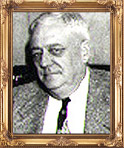 |
 |
| |
|
|
|
Joseph
Boyle was Vice Mayor and upon E. H. Crump's 1940
resignation, became Mayor for 24 hours. |
| |
|
|
|
|
|
|
| |
|
|
|
Walter
Chandler
1940 - 1946 |
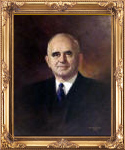 |
 |
| |
|
|
|
Walter
Chandler was city attorney of Memphis from 1928-34.
He was also a delegate to the Democratic National
Conventions in 1940 and 1944. He was supported by
the E. H. Crump machine and was "assigned" the Mayor's job
by E. H. Crump to complete the term that Crump had been
elected to. Sadly, he was little more than a
"figurehead" at this time. He resigned in 1946
because he wanted to return to private practice.
Greatly disappointed when Crump will not support his bid
for Senator. |
| |
|
|
|
|
|
|
| |
|
|
|
Joseph
P. Boyle
1946 |
 |
 |
| |
|
|
|
Once more,
Vice Mayor Joseph Boyle steps in as Mayor after Walter
Chandler resigns in 1946. |
| |
|
|
|
|
|
|
| |
|
|
|
Sylvanus W. Polk, Sr.
1946 - 1947 |
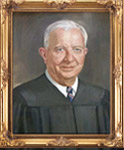 |
 |
| |
|
|
|
E. H. Crump
influenced Mayor Sylvanus Polk and the Park Commission to
purchase 355 acres of land in the county as a balance for
Overton Park. He wanted the name to be Bluebird
Park, but the Commission named it Audubon Park. Polk
resigned April 1947. |
| |
|
|
|
|
|
|
| |
|
|
|
James
J. Pleasants, Jr.
1947 - 1949 |
 |
 |
| |
|
|
|
As mayor,
Pleasants adopted a pension plan and civil protection for
city employees. Involved, with Crump, in refusing to
allow whites and blacks to visit the "Freedom Train"
together in 1947, and thus the Federal Government
cancelled the trains visit to Memphis. He resigned January 1949. |
| |
|
|
|
|
|
|
| |
|
|
|
Watkins Overton
1949 - 1953 |
 |
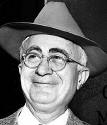 |
| |
|
|
|
2nd Term:
Overton was the great great grandson of the founder of
Memphis and was the longest serving mayor in the history
of Memphis. |
| |
|
|
|
|
|
|
| |
|
|
|
Frank
T. Tobey
1953 - 1955 |
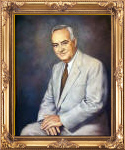 |
 |
| |
|
|
|
Frank Tobey
was E. H. Crump's handpicked successor to Watkins Overton
with whom he no longer supported. Tobey embraced
city planning and was mayor at the time of Crump's death
in 1954. He had a lot of support for his re-election
in 1955, but died of a heart attack during the campaign. |
| |
|
|
|
|
|
|
| |
|
|
|
Walter
Chandler
1955 |
 |
 |
| |
|
|
|
Walter
Chandler completed Frank Tobey's term. He was
considered a sensitive and thoughtful man and he retired
from politics in disappointment after E. H. Crump failed
to support him for a Senate seat. After politics, he
was an active and contributing member of the West
Tennessee Historical Society.
|
| |
|
|
|
|
| |
|
|
|
Edmund
Orgill
1956 - 1959 |
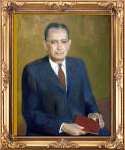 |
 |
| |
|
|
|
Edmund
Orgill, a highly respected businessman (Orgill Bros & Co.), banded together
with other concerned citizens to defeat Crump's candidates
and restore democracy in Memphis. In 1956 he
became the first mayor of
Memphis elected without Crump's backing in almost five
decades.
During his
administration (and afterwards), Orgill helped ease
integration in Memphis. He was key in convincing the
Memphis business community to peacefully desegregate
public places such as department stores, parks, libraries
and eating establishments. |
| |
|
*
Orgill Bros & Co.
have another
page on this website with comprehensive coverage ...
>
Click here |
| |
| |
|
|
|
|
|
|
| |
|
|
|
Henry
Loeb
1960 - 1963 |
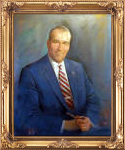 |
 |
| |
|
|
|
Loeb was
elected at the age of 39. During this first term, he
was an ardent segregationist, and opposed such projects as
the construction of a new stadium, a civic center and fine
arts center. Loeb resigned October 1963 to take over the
family business. |
| |
|
|
|
|
|
|
| |
|
|
|
Claude
Armour
1963 |
 |
 |
| |
|
|
|
Claude Armour was Interim
Mayor for two months in 1963 due to the resignation of
Henry Loeb. |
| |
|
|
|
|
|
|
| |
|
|
|
William B. Ingram
1963 - 1967 |
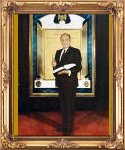 |

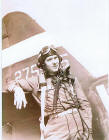 |
| |
|
|
|
|
|
|
|
|
|
|
| |
|
|
|
Henry
Loeb
1968 - 1971 |
 |
 |
| |
|
|
|
Loeb was
mayor during the 1968 Sanitation Worker's strike ... and
the assassination of Dr. Martin Luther King, jr.
After the strike ended, the city was left sharply divided
and traumatized. Although it was generally
considered that Loeb handled the situation badly, he never
felt he should have done anything differently. |
| |
|
|
|
|
|
|
| |
|
|
|
J.
Wyeth Chandler
1972 - 1982 |
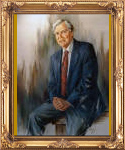 |
 |
| |
|
|
|
Chandler
was mayor at the time of death of Elvis Presley and
the city filled up with mourners and then the police and
fire departments went on strike. His tenure also
included the redevelopment of Beale Street and the
development of Mud Island. He resigned October 1982
to accept a seat as judge on the Circuit Court.. |
| |
|
|
|
|
|
|
| |
|
|
|
J. O.
Patterson, jr.
1982 |
 |
 |
| |
|
|
|
J. O.
Patterson served as Interim Mayor for 20 days in 1982,
following the resignation of J. Wyeth Chandler, to become
a judge. He
was the first African American to serve as Mayor. |
| |
|
|
|
|
|
n to ever hold the office |
| |
|
|
|
Wallace Madewell
1982 |
 |
 |
| |
|
|
|
Wallace
Madewell succeeded J. O. Patterson who was temporary
manager after Chandler's resignation |
| |
|
|
|
|
|
|
| |
|
|
|
Richard D. Hackett
1982 - 1991 |
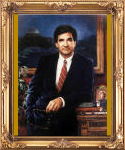 |
 |
| |
|
|
|
Hackett was
33 years old when elected - the youngest mayor of a major
U. S. city. He was a fairly popular mayor during his
9 years in office. He ran and won three times,
But by 1991 he had become vulnerable due to changing
demographics (white flight), as well as controversies
during his second term (Holiday Inn's headquarters moving
to Atlanta, and "issues" involving the financing of the
Pyramid Arena. During his 9 yeas, tourism, downtown
redevelopment, business growth and non-profit development
were his main priorities. |
| |
|
|
|
|
|
|
| |
|
|
|
W. W.
Herenton
1992 - 2009 |
 |
 |
| |
|
|
|
Willie W.
Herenton was the first African American elected Mayor in
Memphis, and he was re-elected to a total of five terms.
He resigned in 2008 to run as Superintendent of the School
Board. Obviously with an election record of five
terms he did "something right", but during his final
days in office, he faced many criticisms from Memphians,
including "Failure to ensure sound fiscal management of
the City of Memphis. Fraud allegations involving
national money for the building of the FedEx Forum,
Failure to communicate effectively with the City Council,
Failure to address multiple allegations of improprieties
regarding Memphis Light, Gas, and Water, Angering citizens
to the point of becoming a target of a recall effort,
Doing little in response to the significant rise in crime
under his leadership, Appointing new leadership to the
Memphis Public Library over the objections of the
Tennessee Library Association. Etc." |
| |
|
|
|
|
|
|
| |
|
|
|
Myron
Lowery
2009 ...Pro tem |
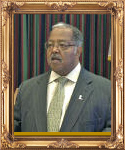 |
 |
| |
|
|
|
Myron
Lowery became interim mayor following the retirement of
Mayor W. W. Herenton. He ran for Mayor in a special
election in 2009, losing to A. C. Wharton. His
tenure as Mayor Pro Tem was marked by attempts to remove
officials from Herenton's prior administration and efforts
at transparency in government. In 2015, Lowery moved
to unearth the remains of Civil War general Nathan Bedford
Forrest and his wife and have his memorial removed because
"It is no longer politically correct to glorify someone
who was a slave trader and someone who was a racist, on
public property." |
| |
|
|
|
|
|
|
| |
|
|
|
A. C.
Wharton
2009 - 2015 |
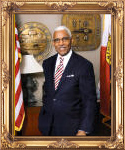 |
 |
| |
|
|
|
A. C.
Wharton ran for Mayor of Memphis in a special election to
replace Mayor Herenton in 2009. He won with a 60% of
the vote in a field of 25 candidates. His win made
him the fourth African American to serve as Memphis Mayor.
In 2010 Wharton pleeged to build over 50 miles of bicycle
lanes in Memphis. The Memphis Greenline was
completed and bike lanes were designated throughout the
city. He created the city's Office of Talent and
Capital in an effort to promote employment in the city.
He has been criticized for awarding contracts to his
friends, for under-funding Memphis City Schools,
Under-funding the Memphis Police Department, and for
cutting services for young people and the elderly while
offering incentive packages to corporate interests.
In 2014, the City Council passed Wharton's budget which
included his plan to cut retiree and current employee
health benefits. On the plus side, after being
on Forbes 2010 ranking of "Most Miserable City in
America", Memphis no longer appeared on that list by 2013.
During his last year, three Civil War parks were renamed
and he supported Lowery's proposals to exhume bodies of N.B. Forrest and
wife to Elmwood Cemetery and sell the Forrest statue.
In 2015 A. C. Wharton lost his re-election campaign and
conceded to Jim Strickland. He only obtained 22,199
votes compared to Strickland's 41,829. |
| |
|
|
|
|
|
|
| |
|
|
|
Jim
Strickland
2016 - present |
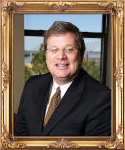 |
 |
| |
|
|
|
Jim
Strickland was first elected to the City Council in 2007
and was Vice Chairman in 2013 and Chairman in 2014.
He ran for Mayor in 2015, focusing on crime and poverty
throughout Memphis and was elected with 41.55% of the
city's vote. |
| |
|
|
|
|
|
|
|
|
|
|
|
|
|
|
|
|
|
|
|
|
Thanks to George
Whitworth for photographing the mayor's portraits at City Hall |
|
|
|
|
|
|
|
|
|
|
|
|
|
|
|
|
|
|
|
|
Credits |
|
|
|
The
Historic-Memphis website does not intentionally post copyrighted
photos and material without permission or credit.
On
occasion a "non-credited" photo might possibly be posted because we
were unable to find a name to give credit. Because of the nature of
our non-commercial, non-profit, educational website, we strongly
believe that these photos would be considered "Fair Use. We have
certainly made no monetary gain, although those using this website
for historic or Genealogy research have certainly profited. If by
chance,
we have posted your copyrighted photo, please contact us, and we'll
remove it immediately, or we'll add your credit if that's your
choice. In the past, we have found that many photographers
volunteer to have their works included on these pages and we'll
also do that if you contact us with a photo that fits a particular
page. |
|
|
|
The "Historic-Memphis" website would like to acknowledge and thank the
following for their contributions which helped make this website
possible:
Memphis
Public Library, Memphis University Library, Memphis Law Library,
Memphis Commercial Appeal, Memphis Press Scimitar, Shelby County
Register of Deeds, Memphis City Schools, Memphis Business Men's
Club, Memphis Chamber of Commerce, Memphis City Park Commission,
Memphis Film Commission, Carnival Memphis, Memphis Historical
Railroad Page, Memphis Heritage Inc, Beale Street Historic District,
Cobblestone Historic District, Memphis Historic Districts, Vance
Lauderdale Family Archives, Tennessee State Archives, Library of
Congress, Kemmons Wilson Family, Richard S. Brashier, Lee Askew,
George Whitworth, Woody Savage and many individuals whose assistance is
acknowledged on the pages of their contributions. Special
thanks to Memphis Realtor, Joe Spake, for giving us carte blanche
access to his outstanding collection of contemporary Memphis photos.
We do not have high definition copies of the photos on these
pages. If anyone wishes to secure high definition photos,
you'll have to contact the photographer or the collector.
(To avoid any possibility of contributing to SPAM, we do not
maintain a file of email addresses for anyone who contacts us). |
|
|
|
|
| |
|
|
|
|
|
|
|
|
|
|
| |
|
|